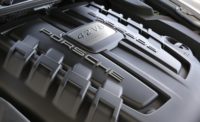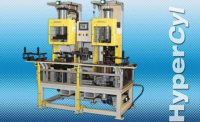Exhaust from diesel engines is a major source of air pollution. Nitrogen oxides (NOx), particulate matter (PM) and other pollutants from diesel exhaust are known to impair human health, causing cancer, heart and lung damage, and impaired mental functioning.
As a result, Europe, the United States, Japan and China are all taking steps to mitigate the problem, enacting regulations aimed at making diesel engines more efficient and less polluting. These regulations have been enacted in a series of tiers or stages over the years, with each tier becoming more strict.
China, for example, recently introduced its Stage VI emissions standard. Based on the European Union’s Stage VI standard, China’s standard is being implemented in two stages. Stage VI-a came into force July 1, 2020. Stage VI-b—which establishes goals for reducing CO2, PM and NOx by double-digit percentages—takes effect July 1, 2023.
Servo presses are used to assemble components such as steel balls, valve seats and guides, seals, intake hoppers and outlet openings. Photo courtesy Kistler Instrument Corp.
Over the long term, the standard should significantly reduce air pollution, especially in China’s mega-cities. But complying with the standard will require major changes in the way that diesel engines and vehicles are designed, manufactured and operated.
One manufacturer dealing with the issue is Guangxi Yuchai Machinery Co. Ltd. Based in Yulin, China, Yuchai assembles fuel-efficient, low-emission diesel engines for trucks, buses and other commercial vehicles. Founded in 1951, the company operates seven other plants throughout China. With more than 15,000 employees, Yuchai posts annual sales of $5.7 billion. As one of China’s market and technology leaders for engines, Yuchai embraces cutting-edge technologies and collaborates with universities across the globe including Brunel University in London, RWTH Aachen University in Germany, and Shanghai Jiao Tong University in China.Seeing the writing on the wall, in 2016 Yuchai began building the first of two new production lines at its Yulin headquarters specifically to manufacture fuel-efficient, low-emission diesel engines. On Jan. 8, 2018, Yuchai became the first manufacturer in the country to produce Stage VI-compliant diesel engines. In 2019, the second production line went into operation.
The new lines feature state-of-the-art production equipment. From day one, electromechanical joining systems from Kistler Instrument Corp. were deployed for press-fit processes—a choice based on their combination of accuracy, energy efficiency and real-time process monitoring.
“We used to operate hydraulic and pneumatic press-fit systems. They function well, but they are energy-intensive and above all, they are very noisy,” says Mr. Liu, head of operational safety at Yuchai’s Yulin operation. “Thanks to Kistler, we were able to opt for a better alternative. Now, everything is much cleaner and quieter, and the whole process is far more orderly.”
Yuchai’s Yulin operation is an enclosed production environment equipped with large numbers of air conditioning systems, so limiting the noise level is no small thing. The new approach also yields benefits in terms of setting up the individual stations, and for maintenance: “The systems from Kistler are more compact and more flexible, and they are simpler to commission – so regular maintenance jobs are easier as well,” says Mr. Liu, who is responsible for technical equipment, maintenance and troubleshooting in the plant.
Of the six series of electromechanical joining systems offered by Kistler, Yuchai uses two: the NCFN and NCFH. The NCFN is for applications requiring 5 to 300 kilonewtons of force. The NCFH is equipped with a hollow-shaft motor for highly dynamic processes and short cycle times. Its force output ranges from 1 to 60 kilonewtons. Both series feature integrated force control and high velocity and measurement accuracy. And, both are equipped with active deflection compensation. In conjunction with the maXYmos Numeric Control process monitoring system from Kistler, these systems can be integrated efficiently into highly automated production lines via Ethernet.
Numerous NCFN and NCFH modules from Kistler are deployed for joining processes at several stations on both lines. They are used to assemble components such as steel balls, valve seats and guides, seals, intake hoppers and outlet openings. Press-fit assembly of engine components is now done entirely with force-displacement monitoring.
“One simple test is sometimes not enough to detect potential defects and optimize the quality of the process,” says Mr. Liu. “Thanks to systems from Kistler, we can now respond to challenges that may arise in many areas: part tolerances, machine instability, process errors and other hidden factors that negatively impact process reliability. This means we can achieve and maintain very high quality in our press-fit processes.”
Besides standard press modules, Kistler also supplied Yuchai with a custom joining module that no other Chinese engine manufacturer has. This variant of the NCFN module has an extra-long stroke: 1,000 millimeters vs. the standard length of 400 millimeters.
“Thanks to this tailor-made solution, we’ve been able to sustainably optimize our production,” says Mr. Liu. “Kistler has demonstrated outstanding flexibility and technical understanding throughout the process. Systems from Kistler are simple to operate, and they’re highly reliable.”









